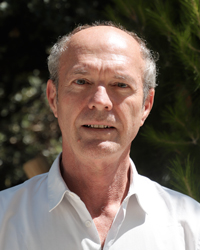Biography
Geneticist, molecular and cell biologist, Simon Galas is Full Professor at the University of Montpellier - Faculty of Pharmaceutical sciences and researcher at CNRS IBMM-UMR 5247. His work led him to explore the molecular basis of cell division using biochemistry and genetics during his PhD in Biochemistry, Molecular and Cellular Biology at the Faculty of Medicine, University of Montpellier, under the supervision of Prof. Marcel Dorée (1995), then as director of his research group at the CNRS in Montpellier and Associate Professor at the Faculty of Science, University of Montpellier (1996). He has contributed to the discovery of new cell cycle regulatory mechanisms and the identification of major new regulatory proteins for cell division. He has worked on models such as starfish, sea urchins, xenopus, yeast and the nematodeCaenorhabditis elegans. This work provided the fundamental basis for the emergence of modern cancer therapies. After a three-year period as Honorary Research Fellow for research on Aging at University College London, he founded a laboratory for the molecular genetics of Aging/senescence at CNRS - Université de Montpellier, using the Caenorhabditis elegans model. His work was dedicated to the study of the mechanisms involved in programming longevity, Aging and resistance to stress. He obtained an HDR in genetics from the Faculty of Science at the University of Montpellier in 2002, and became University Professor at the Faculty of Pharmaceutical sciences at the University of Montpellier in 2005. In the same year, he created a Master's degree at the University of Montpellier - Faculty of Pharmacy, which would become the Master's degree course in Drug Science - Aging and anti-Aging strategy. From 2015, he developed an emerging study model: the tardigrade, and collaborated with physicists and biologists from La Sapienza University in Rome, as well as Okayama and Tokyo in Japan, to study the extraordinary physical resistance capacities of this extremophilic organism. Permanent breeding of tardigrade species has been carried out in his laboratory for the past 10 years. The genetic model of the nematode Caenorhabditis elegans is used to search for molecular targets of chemical molecules, anti-cancer therapeutic candidates, synthesized at the Pôle Chimie Balard of the CNRS in Montpellier (IBMM and ICGM). His laboratory collaborates with industry, private R&D laboratories and academia to assess the anti-aging effects of molecules derived from plant extracts, and the CMR (transgenerational epigenetic) effects of industrial gases. Simon Galas works in several faculties at the University of Montpellier: Medicine, Science and Pharmacy. He is also a lecturer at the Ecole Pratique des Hautes Etudes - Paris Sorbonne. He has contributed to educational books on the cell cycle (de Boeck Supérieur ed., 2008), toxicology (Lavoisier ed., 2009), Aging (Vuibert ed., 2010) and the Tardigrade (CNRS ed., 2023). He is the author of feature articles on subjects dealing with theories of aging and its molecular determinism in international scientific journals (Nature Scientific Reports, Aging, Experimental gerontology, Oxford University Press, ...) or encyclopedias (2019 - Nature Springer, Encyclopedia of Gerontology and Population Aging; 2020 - Oxford Academic Press, Encyclopedia of Biomedical Gerontology). Simon Galas regularly gives lectures for the general public and contributes to popular science magazines (Epsiloon, Science et vie, Science & Vie Junior, La recherche, Pour La Science, etc.) and specialist journals (Biofutur, Quotidien du médecin) as author, editorial writer or scientific coordinator, and to events for the general public (Université du Tiers Temps, Pint of Science, Fête de la Science, Nuit des chercheurs, etc.). ...), French press (Le Monde, Le Figaro, Le Point, l'Humanité, Marianne, ...) and foreign media (The Guardian, Le Temps Genève,...), internet (The Conversation, National Geographic, Brut média, Metropolitain,...), TV media (Arte, Canal +, France 5,...) and radio (France Info, France inter, France Culture, France 5, France 3, Radio Campus, radio RCF,...).

